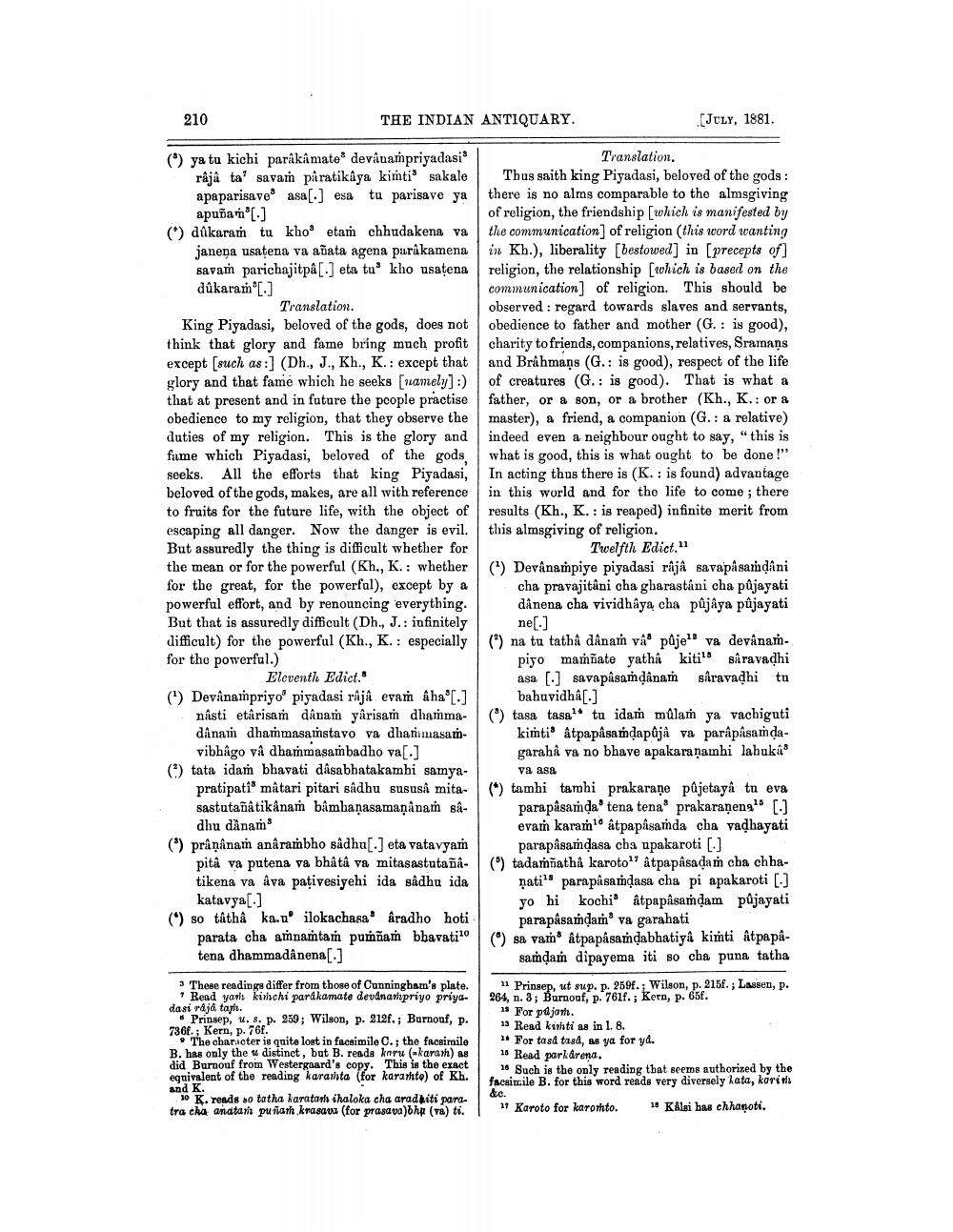________________
210
THE INDIAN ANTIQUARY.
.(JULY, 1881.
ya tu kichi parâkamate devậuampriyadasi raja ta' savam paratikâya kimti sakale apaparisave asa[.) esa tu parisave ya
apuñamo[.] (1) dikaran tu khoetam chhudakena va
janeņa usatena va amata agena puråkamena savam parichajitpâ[.] eta tu kho usatena důkaram"[.]
Translation. King Piyadasi, beloved of the gods, does not think that glory and fame bring much profit except (such as :) (Dh., J., Kh., K.: except that glory and that fame which he seeks (namely]:) that at present and in future the people practise obedience to my religion, that they observe the duties of my religion. This is the glory and fame which Piyadasi, beloved of the gods seeks. All the efforts that king Piyadasi, beloved of the gods, makes, are all with reference to fruits for the future life, with the object of escaping all danger. Now the danger is evil. But assuredly the thing is difficult whether for the mean or for the powerful (Kh., K.: whether for the great, for the powerful), except by a powerful effort, and by renouncing everything. But that is assuredly difficult (Dh., J.: infinitely difficult) for the powerful (Kh., K. : especially for the powerful.)
Eleventh Edict." (1) Devanapriyo piyadasi raja evam âha [.]
nâsti etârisam dânam yârisam dhammadana dhammasamstavo va dhati masam
vibhago va dhammasambadho va[.] (1) tata idam bhavati dâsabhatakambi samya
pratipati mâtari pitari sådhu sususâ mitasastutañâtikanaṁ bâmhanasamaņânam sa
dhu dânam (*) prânînan anârambho sådhu[.) eta vatavyam
pitâ va putena va bhâtâ va mitasastutañatikena va ava pațivesiyehi ida sådhu ida
katavya[:] (*) so tatha ka.n ilokachasa Aradho hoti
parata cha amnamtam pumñam bhavati tena dhammadậnenal.
Translation, Thus saith king Piyadasi, beloved of the gods : there is no alms comparable to the almsgiving of religion, the friendship (which is manifested by the communication) of religion (this word wanting in Kh.), liberality (bestowed] in (precepts of] religion, the relationship (which is based on the communication] of religion. This should be observed : regard towards slaves and servants, obedience to father and mother (G. : is good), charity to friends, companions, relatives, Sramans and Brahmans (G.: is good), respect of the life of creatures (G.: is good). That is what a father, or a son, or a brother (Kh., K.: or a master), a friend, a companion (G.: a relative) indeed even a neighbour ought to say, "this is what is good, this is what ought to be done!" In acting thus there is (K. : is found) advantage in this world and for the life to come; there results (Kh., K. : is reaped) infinite merit from this almsgiving of religion.
Twelfth Edict." (1) Devânampiye piyadasi râjâ savapasamdani
cha pravajitâni cha gharastani cha půjayati dånena cha vividhaya cha půjấya pûjayati
nec.] (%) na tu tath & dânam va paje" va devânam
piyo mamñate yatha kiti si ravadhi asa (.) savapasamdanam shravadhi tu
bahuvidha [.] () tasa tasa tu idam mülam ya vachiguti
kimti atpapåsandapůjà va parâpasamdagarahî va no bhave apakaranamhi labuka
va asa (*) tamhi tamhi prakarane půjetaya tu eva
parapåsanda tena tena prakaraṇeng"" [.] evam karam atpapåsanda cha vadhayati
parapásamdasa cha upakaroti (.] () tadańñatha karoto" atpapåsadam cha chha
nati" parapåsardasa cha pi apakaroti [.] yo hi kochi atpapåsamdam půjayati
parapásamdam va garahati () sa vamo atpapåsandabhatiya kimti atpapå
samdam dipayema iti so cha puna tatha
3 These readings differ from those of Cunningham's plate. 1
* Read yaris kinchi pard kamate devanarlpriyo priya- dasi raja tag.
• Prinsep, u. s. p. 259; Wilson, p. 212f.; Barnouf, p. 736f.; Kern, p. 76f.
The character is quite lost in facsimile C.; the facsimile B. has only the u distinct, but B. reads koru (akaran) as did Burnouf from Westergaard's copy. This is the exact eguivalent of the reading karanta (for kararte) of Kh. and K.
10 K. reads so tatha karatash thaloka cha araditi paratra cha anatan puñar krasav (for prasava)bhp (va) ti.
11 Prinsep, ut sup. p. 2598.; Wilson, p. 215f. ; Lassen, p. 264, n. 3; Burnouf, p. 761f.; Kern, p. 65.
15 For pdjorh. 13 Read koristi as in 1. 8. 2. For tasd tusd, as ya for yd. 15 Read parkdrena.
16 Such is the only reading that seems authorized by the facsimile B. for this word reads very diversely hata, karits &c.
17 Karoto for karothto. 15 KAlsi has chhanoti.




